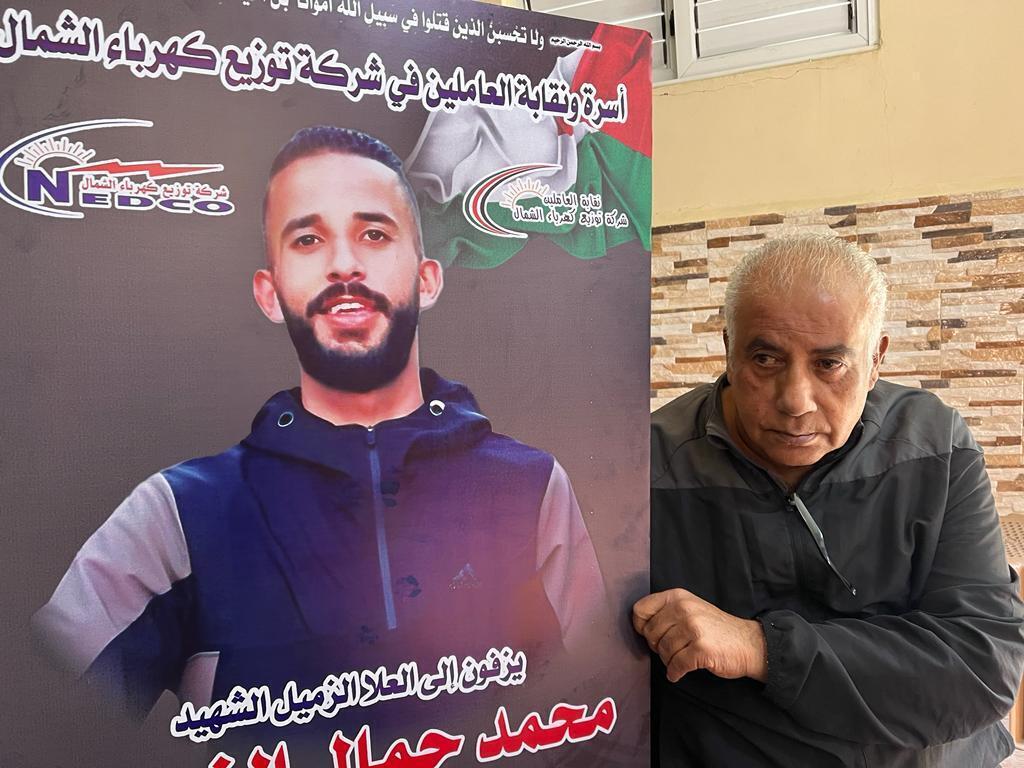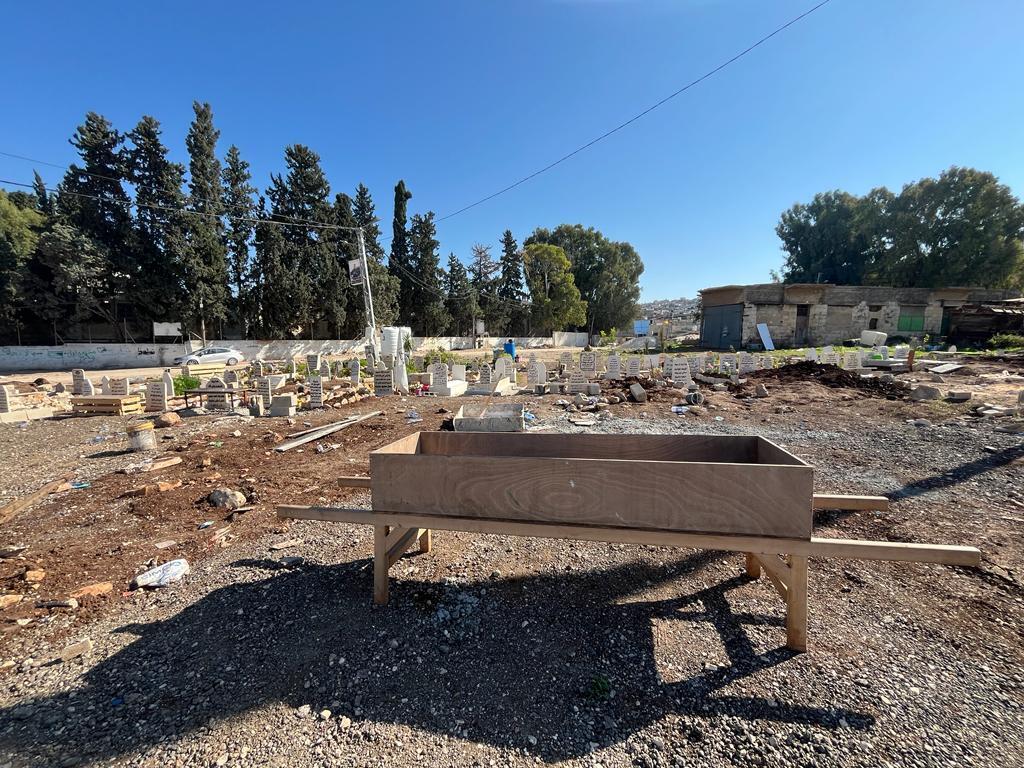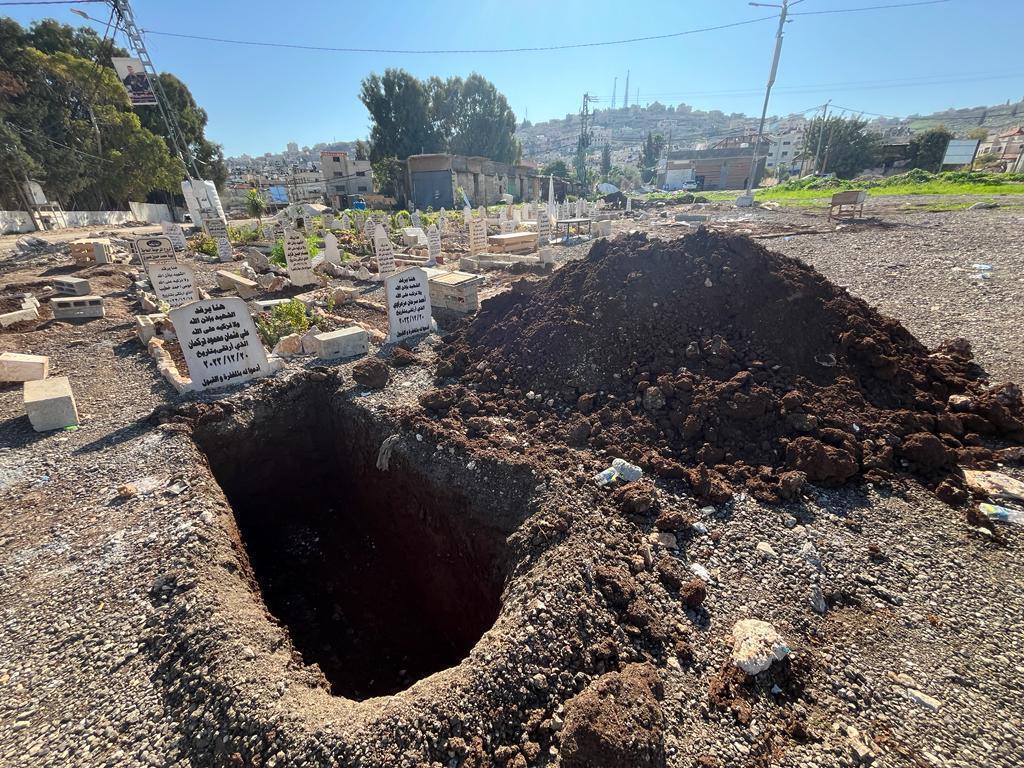From our special correspondent in the West Bank – In the occupied West Bank, four brothers were killed on Sunday during an Israeli strike in Jenin, which left a total of 7 dead. While the family buried its “martyrs”, others are awaiting the return of the remains of loved ones held by the Israeli army.
She doesn’t cry. She does not speak. Ibtesam Darwish seems stunned. “I wasn’t just their mother, I was their friend. We were very close.” Sitting in her neighbors’ courtyard in Qabatiya, in the occupied West Bank, she waits for the remains of her sons. Rami, 22, Ahamed, 24, Hazaa, 27, and Alaa, 29, were killed along with two others at 6 a.m. Sunday, January 7, by an Israeli strike while they were at the entrance to Jenin , near the Martyrs roundabout. A seventh person died of their injuries later in the day.
The Israeli army claimed “that it attacked terrorists who threw explosives at troops and that a helicopter fired on suspicious areas while helping to rescue the wounded” according to Times of Israel. A version contradicted by eyewitnesses who claim that the young people, unarmed, were sitting and trying to warm themselves near a fire when the strike took place. They said the troops were withdrawing after a night of violent clashes with the Jenin Brigades, and that one soldier had been killed.
The Israeli army killed last night 6 Palestinian civilians in Jenin including 4 brothers. The attached is the photo of the 4 brothers and a video of the shock on the face of their mother. pic.twitter.com/kdZmMJZAb8
— Mustafa Barghouti @Mustafa_Barghouti (@MustafaBarghouti1) January 7, 2024
Informed by social networks
Ibtesam knew his sons were not at home. They wanted to watch the Israeli army’s raid on the Jenin refugee camp. “In the early morning, I saw that there had been a drone attack and that four people from the same family had been killed,” she says quietly. “I called them immediately but no one answered. I left them a message asking them to call me back immediately. I learned that they were dead through social media.”
The mother immediately went to the local hospital. In a video posted on Supported by one of her children, we see her discover the torn body of one of her sons under a survival blanket. Vision of horror. She lets out a muffled cry.
{{scope.counterText}}
{{scope.legend}}
© {{ scope.credits }}
{{scope.counterText}}
{{scope.legend}}
© {{ scope.credits }}
A few hours have passed and it is time to say goodbye. In the courtyard of Qabatiya’s house, the crowd is growing in number. Dozens of women wait in silence. The men are outside. The sweeping of cars is incessant. Residents of Qabatiya and Jenin arrive in waves to attend the funeral or send their condolences to Ibtesam. The father of the family, a worker in Jordan, is not there. In the Muslim religion, burial must take place within 24 hours. Before sunset if the death occurred in the morning, the next morning if it occurred in the evening.
Under an increasingly scorching sun, the atmosphere is suffocating. Only the clicking of the photographers’ cameras can be heard. The mother of nine children, seven boys and two girls, explains that death is part of daily life in the occupied West Bank. “It’s the life of Palestinians. We go out in the morning and don’t know if we’re going to come back in the evening,” she says simply. “I have three sons left. If they kill them, we will make more. We will continue to resist.”
Suddenly, gunshots break the silence. The funeral procession draws nearer. Men’s voices are raised. They pronounce Takbir. “Allahu Akbar ! [Dieu est le plus grand, NDLR]”. “Lâ Ilâha Illa Allah! [Il n’y a pas de dieu à part Allah]. The shots are more numerous. Closer. Deafening. Hundreds of men arrive in the courtyard. They are carrying four stretchers. The remains of Hazaa, Rami, Ahamed and Alaa are wrapped in the green Hamas flag. A Palestinian keffiyeh covers their heads. One by one, they are placed on the ground. Bursts of gunfire to commemorate the dead. A compact crowd gathers around the “martyrs”. A ubiquitous term that refers to Palestinians killed by Israeli soldiers, whether combatants or not.
Bursts of fire. Again and again. M16s and other assault rifles. Men dressed in black, their faces hidden under full hoods. Fighters from the various brigades of the Jenin refugee camp are there. Many flags are flying among the crowd. Sometimes agitated by very young children. White for the Jenin Brigades, green for Hamas, yellow for the Fatah party. Without forgetting the Palestinian flag.
Time seems to stand still. The prayers continue. The gunshots too. The four remains are lifted again by the men. A groan of pain. Ibtesam watches the procession leave with his sons. She won’t go to the cemetery. In the Muslim religion, women do not attend the burial. Those who had come to support her in this ordeal surrounded her even more. They cry. Not her. She was able to say goodbye to her children.
The retention of remains, “a collective punishment”

Jamal Zubeidi was not so lucky. His son Mohammed, “Hammoudi”, as he nicknamed him, was not buried. Not yet. He was killed on November 29 during an Israeli army raid on the Jenin camp. Considered as a senior figure in Palestinian Islamic Jihad by the Shin Bet, Israeli intelligence services, the remains of the 27-year-old man were taken away by soldiers. According to the Shin Bet, in May 2023, Mohammed Zubeidi participated in planning a terrorist attack that left one person dead near the Hermesh settlement and another in June in which a civilian and four soldiers were injured.
Withholding the remains of Palestinians suspected of or having committed attacks is a long-standing practice in Israel. “The bodies of the terrorists are detained in accordance with the directives of the political authorities,” explains one of the army spokespersons contacted by France 24.
“Twenty years ago, it was a kind of undeclared policy but now it’s official. We represent several families who are waiting,” says Jessica Montell, director of the Israeli NGO for the defense of human rights. the HaMoked Man.
In 2019, this practice was officially authorized by the Israeli Supreme Court. Also frequently used by Hamas or Lebanese Hezbollah for the remains of Israeli soldiers, it is “a bargaining chip in future negotiations”, adds Dror Sadot, spokesperson for B’Tselem, the Israeli information center on human rights in the occupied territories. “There have been periods when this policy was used and others not. The number of bodies involved is also very vague.”
Between 1991 and 2008, Israel reached agreements to exchange 405 bodies for those of deceased soldiers, according to data collected by the Israeli NGO. “The national campaign to recover the bodies of martyrs” launched by the Jerusalem Legal Aid Center (JLAC), estimates that 450 remains are kept in Israeli cemeteries and morgues, including 47 since October 7. According to their data, 2023 would be a record year with 101 bodies retained, 22 of which were returned. The Gaza Strip is not included in these figures due to lack of access.
For B’Tselem as for HaMoked, the retention of Palestinian bodies can also be considered a form of “collective punishment”. “It’s a punishment to make us suffer even more,” confirms Jamal Zubeidi in the Jenin refugee camp marked by the scars of the night. “They think it will deter the fighters.”

The hope of an exchange
Denying families the right to bury their loved ones causes indescribable pain. Whether Palestinian or Israeli. Funeral rites, whether religious or not, allow one to mourn. Without a grave this becomes impossible.

“Her grave has been dug. She is waiting for him,” says the father of nine children, two of whose sons were killed by the Israeli army and another is currently in administrative detention. “I want to bury him, visit him. I have no body. No proof. How do you expect me to accept that he is dead? I hope he is not. We We need to see it to believe it.”
Jamal is hopeful that he will be able to recover Mohammed’s remains through a possible new exchange between Hamas and the Israeli government. Negotiations to release hostages held in the Gaza Strip since October 7 could see Palestinian detainees released but also remains returned, on each side. “Otherwise, it will be difficult,” he admits.
The sadness of the sixty-year-old, himself spent in Israeli prisons, can be seen on his face. Fatigue too. “We are like all families, we are afraid all the time for our children. We are sad because he died but we are proud that he died as a martyr. Freedom must be paid for with the price of blood” .

